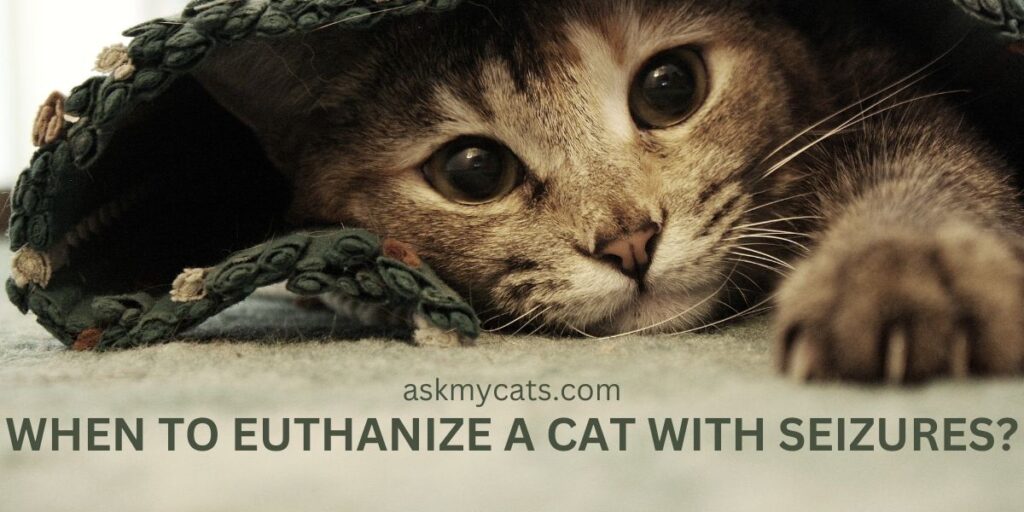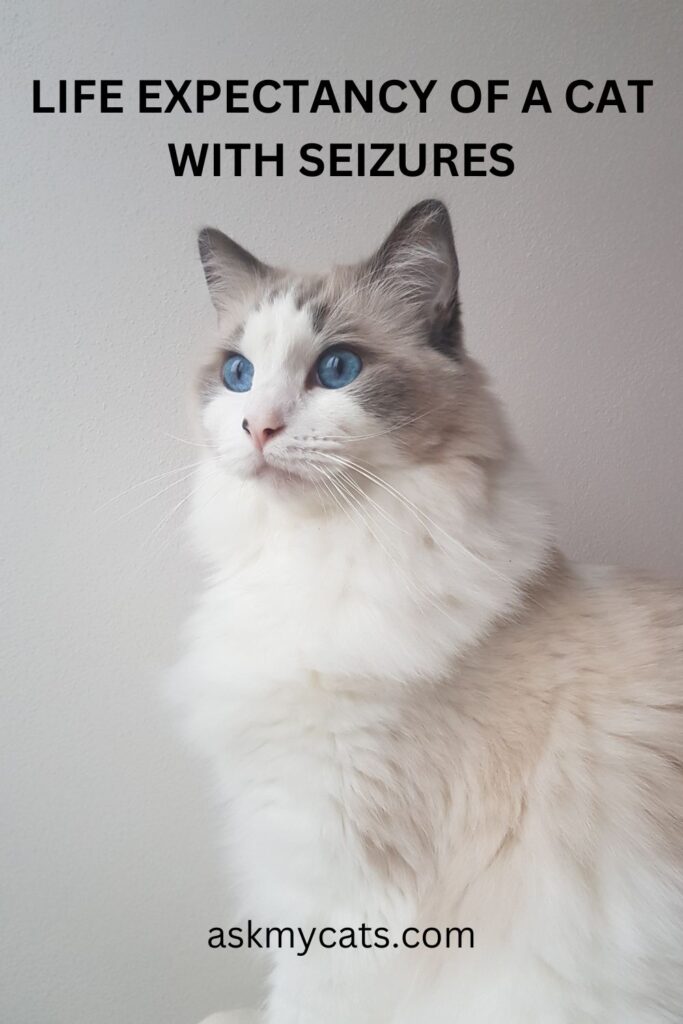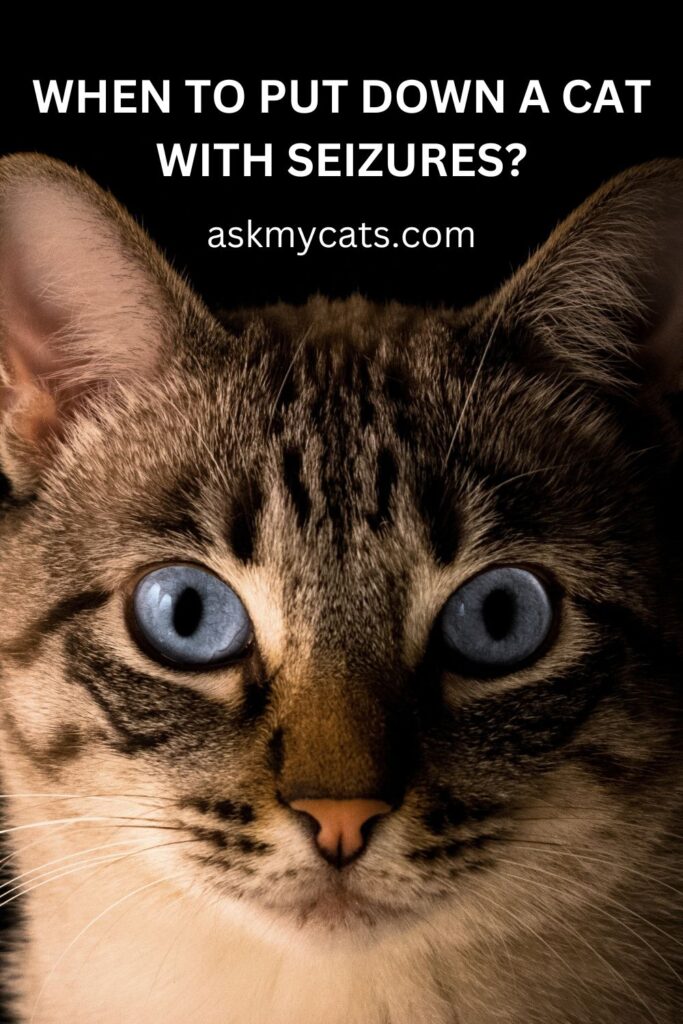Euthanizing your pet cat, no matter the reason, is never an easy decision to make. The same is the case with cats who suffer from seizures.
Seizures can be mild and short, lasting between 2 and 5 minutes, or seizures can be intense and long, causing severe health complications, and sometimes even death.
That is why it is important to consider the quality of life of your cat before concluding and opting for euthanasia.
In this article, we will navigate through how seizures affect the overall life and health of your cat, and when is the right time to put your cat down if it experiences constant seizures.
Key Takeaways
- A seizure is an abnormal electrical activity in the brain that causes a cat to have symptoms such as drooling, puking, convulsing, and even losing consciousness.
- The most common cause of seizures in cats is a chronic condition called epilepsy.
- Causes of seizures in cats include: trauma to the head, pathological issues, ingestion of human medications, and epilepsy.
- The life expectancy of a cat with seizures depends on the underlying cause of the seizures.
- It is important to consider the quality of life of your cat before concluding and opting for euthanasia.


Give Your Cat the Perfect Day
Get the Free Ebook!
What Is A Seizure And How Does It Affect A Cat?
Simply put, a seizure is an abnormal electrical activity in the brain that causes a cat to have symptoms such as drooling, puking, convulsing, and even losing consciousness.
The most common cause of seizures in cats is a chronic condition called epilepsy. Seizures have differing intensities, durations, and complications. Some seizures may last for very short durations with symptoms so mild that you may not even notice.
However, sometimes, your cat may experience a seizure that lasts for a couple of minutes and has intense convulsions, drooling, and other scary symptoms.
Usually, a cat’s brain is able to resent and return to normal functioning soon after the seizure ends. Your cat may still be disoriented after a seizure and require some time to feel normal again.
Check out the in-depth guide: When To Put Your Cat Down? The Complete Checklist
What Are The Causes Of Seizures In Cats?

There are several underlying causes that may cause your cat to have seizures.
1 – Trauma to the head.
This happens when the cat or kitten either falls off a height, or some heavy object falls onto their head. Such trauma can lead to seizures, concussions, and hemorrhages.
2 – Pathological issues.
Other than acute physical trauma, there are pathological reasons too that can cause your cat to suffer from seizures. A cat with a brain tumor is very likely to experience regular seizures.
Moreover, infections and parasitic infestations such as toxoplasmosis can also be the underlying causes of otherwise unexplainable seizures.
3 – Ingestion of medicines meant for human beings.
This is one of the most common causes behind a cat experiencing sudden seizures. Accidentally ingesting human medicines such as Advil or Tylenol can lead to a cat having seizures. In very high doses, it could even lead to the death of the cat.
4 – Epilepsy.
If your cat has too many seizures too frequently, you should take it to the vet for the diagnosis of possible epilepsy.
It is a chronic condition of seizures that are much more intense than those one-off seizures that your cat may sometimes experience due to a concussion or ingestion of a small amount of unsafe medication.
Interesting Read: How To Euthanize A Cat At Home?
Life Expectancy Of A Cat With Seizures

Depending on the cause of seizures in a cat, the life expectancy may vary.
1 – Seizures Due To Injuries
If a cat experiences seizures due to severe physical trauma to the head, the life expectancy will depend on the intensity of the injury.
If the injury is not life-threatening, then the seizures will be mild and last for a short duration only.
If the injury is very grave, it may lead to longer, more intense seizures, physical disabilities such as partial or total paralysis, and sometimes, even death.
2 – Seizures Due To Pathological Reasons
If your cat is experiencing seizures as a result of a brain tumor, the life expectancy of your cat depends on the grade of the tumor.
Primary brain tumors with strictly palliative care will let a cat survive for 3 to 6 months. On the other hand, a primary brain tumor that can be surgically removed will lead to an increased survival period for the cat between 28 to 54 months.
Unfortunately, if a cat has a secondary brain tumor, it may not be able to survive for more than a month.
3 – Seizures Due To Epilepsy
Seizures due to epilepsy do not often lead to death. They can be managed well by taking appropriate precautions and undertaking symptomatic treatment for the affected cat.
4 – Seizures Due To Accidental Ingestion Of Toxic Items
If a cat accidentally ingests something toxic, such as medicines meant for human beings, it may experience seizures.
Whether how fatal this can turn out to be will depend on the dose that was ingested. For smaller doses of medicines being ingested, the consequences won’t be life-threatening.
Interesting Read: How To Euthanize A Cat With Over-The-Counter Drugs?
Can A Seizure Itself Kill A Cat?
While the aforementioned sections describe how the underlying causes of seizures may affect a cat’s life expectancy, it may help to know that seizures themselves don’t pose a very big risk to the life of a cat.
A seizure involves drooling, vomiting, and convulsing. But if you ensure that your cat is in a cushioned environment and take precautions to ensure it does not fall off a height or hit something hard while convulsing, the seizure in itself won’t kill your cat.
That is why you need to investigate the root cause behind a cat’s seizure. The seizure itself may seem harmless, but the underlying root cause can lead to some complications of health that can become life-threatening for your cat.
Interesting Read: Should I Stay With My Cat When It Is Euthanized?
When To Put Down A Cat With Seizures?

When, and whether at all you need to put down a cat with seizures depends largely on the underlying cause of the seizures.
If the seizures of your cat are happening due to epilepsy or minor physical trauma, you do not need to euthanize your cat.
On the other hand, if your cat has been diagnosed with a brain tumor, then, depending on the course of treatment, the grade of the tumor, and your cat’s quality of life, you may have to take a call between continuing treatment and putting your cat down.
When to put down your cat with a brain tumor?
- When the quality of life of your cat has deteriorated beyond repair;
- When your cat has completely stopped eating;
- When the treatments are not working and hospice care is also ineffective in reducing the pain of your cat;
- When your cat has been diagnosed with an incurable secondary brain tumor and won’t be able to survive;
These are times when a cat owner may actually be helping their cat by opting for euthanasia. Putting your cat down in such a case is an important responsibility of pet care that you need to provide.
Interesting Read: Did I Put My Cat To Sleep Too Soon?
Frequently Asked Questions
Can a seizure kill a cat?
A seizure in itself cannot kill a cat as long as you ensure that the cat is in a cushioned area and won’t fall off a height or hit something hard while convulsing.
Interesting Read: Did My Cat Know He Was Being Put To Sleep?
Final Words
Seeing a cat experience a seizure can be a scary moment. You should know, however, that most seizures come under control very quickly and unless the cat has an underlying cause, the seizures are not that frequently recurring.
Unless your cat has had a grim diagnosis of something life-threatening, such as a brain tumor, you don’t need to put down your cat simply because it experienced seizures.
Seizures can be manageable as long as the underlying causes of the seizures are not fatal or life-threatening.
Must Read: How To Deal With Regret And Grief After Putting Cat To Sleep?
A Cat Owner’s Final Guide: What To Do After Cat Euthanasia?
Interesting Read: Is It Legal To Euthanize A Healthy Cat?
You Might Also Like To Read:
- What Are The Different Methods Of Cat Euthanasia?
- How Much Does It Cost To Euthanize A Cat?
- Where To Euthanize A Cat For Free Or Cheap?
- When To Euthanize A Cat With Cancer?
- When To Euthanize A Cat With IBD?
- When To Euthanize A Cat With Kidney Failure?
- When To Euthanize A Cat With Feline Leukemia?
- When To Euthanize A Cat With Heart Failure?
- When To Euthanize A Cat With FIP?
- When To Euthanize A Cat With FIV?
- When To Euthanize A Cat With Dementia?
- When To Euthanize A Cat With Arthritis?
- When To Euthanize A Cat With Hyperthyroidism?
